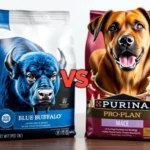
Introduction
In recent years, the popularity of vegan diets has extended beyond humans to our furry friends. More pet owners are exploring the benefits of plant-based nutrition for their dogs, driven by a desire to promote health and wellness while also considering environmental impact. Proper nutrition is essential for dogs to maintain optimal health, and selecting the right diet can significantly influence their quality of life.
This article aims to guide you on how to choose the best vegan dog food by providing insights into vegan dog food, nutritional requirements, benefits, and practical tips on making an informed choice.
Understanding Vegan Dog Food
Vegan dog food is defined as a diet that excludes all animal products, including meat, dairy, and eggs. The distinction between vegan and vegetarian dog food is crucial; while vegan diets eliminate all animal-derived ingredients, vegetarian diets may include dairy and eggs. This difference is important for those who want a completely animal-free nutrition plan for their pets.
Common Misconceptions About Vegan Diets for Dogs
Many misconceptions surround vegan diets for dogs. Some people believe that dogs are obligate carnivores, meaning they must eat meat to survive. However, dogs are omnivores and can thrive on a well-balanced plant-based diet. Another myth is that vegan diets lack essential nutrients. This article will address how a well-formulated vegan diet can meet all of a dog’s nutritional needs.
Nutritional Requirements of Dogs
Understanding the nutritional requirements of dogs is crucial for any pet owner considering a vegan diet. Dogs need a balance of proteins, fats, carbohydrates, vitamins, and minerals to thrive.
Protein Sources in Vegan Diets
In a vegan diet, protein can come from various plant sources such as legumes, grains, and vegetables. It’s vital to ensure that the protein sources are of high quality and provide all essential amino acids. Dogs require specific amino acids, such as taurine and L-carnitine, that are typically found in animal products. Supplementation may be necessary to ensure your dog receives these nutrients in a vegan diet.
Ensuring a Balanced Diet
To provide a balanced diet without animal products, pet owners must focus on incorporating a variety of ingredients. This includes:
- Legumes: Lentils, chickpeas, and peas
- Grains: Brown rice, quinoa, and oats
- Vegetables: Carrots, spinach, and sweet potatoes
- Healthy Fats: Flaxseed oil and coconut oil
Role of Supplements in Vegan Dog Diets
In some cases, supplements may be necessary to round out a vegan dog’s diet. Common supplements include omega-3 fatty acids, vitamin B12, and certain minerals. Always consult with a veterinarian before introducing new supplements to ensure your dog’s health and dietary needs are met.
Benefits of Vegan Dog Food
Switching to vegan dog food can offer numerous benefits not only for your dog but also for the environment and animal welfare.
Health Benefits for Dogs
Many dog owners report health improvements after transitioning their pets to a vegan diet. Some of the key benefits include:
- Improved Digestion: Plant-based diets are often rich in fiber, which can enhance digestive health and regularity.
- Increased Energy Levels: A well-formulated vegan diet can provide sustained energy, leading to more active and playful pets.
- Healthier Skin and Coat: Many pet owners observe an improvement in skin conditions and coat quality, thanks to the inclusion of healthy fats and antioxidants.
Environmental and Ethical Considerations
Choosing vegan dog food can also have a positive impact on the environment. It reduces the demand for animal agriculture, which is a significant contributor to greenhouse gas emissions. Additionally, a vegan diet aligns with animal welfare values, as it eliminates the need for animal exploitation.
Choosing the Best Vegan Dog Food
When it comes to selecting the best vegan dog food, there are several key factors to consider.
Reading Labels and Ingredients
Understanding ingredient lists is crucial when evaluating vegan dog food. Look for high-quality ingredients that provide essential nutrients. Avoid fillers, artificial additives, and by-products. A simple rule of thumb is that if you wouldn’t eat it, you shouldn’t feed it to your dog.
Evaluating Nutritional Content
Always check the guaranteed analysis on the packaging. This section provides information on the nutrient content, including protein, fat, and fiber percentages. Key nutrient ratios to look for include:
- Protein: A minimum of 18-25% for adult dogs
- Fat: Around 8-15% to maintain healthy energy levels
- Fiber: 3-5% to support digestion
Considering the Life Stage and Size of Your Dog
Nutritional needs vary significantly based on a dog’s life stage and size. Puppies require a higher protein content to support growth, while senior dogs may need fewer calories. Additionally, small and large breeds have different dietary requirements, so consider these factors when choosing vegan dog food.
Consulting with a Veterinarian
Before making any significant dietary changes, consulting with a veterinarian is essential. A professional can provide personalized advice based on your dog’s health history and nutritional needs. They can also help you identify any potential concerns or deficiencies that may arise during the transition.
Top Vegan Dog Food Brands
With the rising demand for vegan dog food, several reputable brands have emerged. Here’s a look at some of the most popular options:
Overview of Popular Brands
-
Vegan Brand 1: Known for its high-quality ingredients and balanced nutritional profile, this brand offers a variety of flavors that appeal to picky eaters.
-
Vegan Brand 2: This brand focuses on sustainability and uses organic ingredients, ensuring that your dog receives the best nutrition without harming the planet.
-
Vegan Brand 3: Offering a range of products tailored to different life stages, this brand is renowned for its commitment to animal welfare and ethical sourcing.
Comparison Chart of Top Brands
| Brand Name | Price Range | Key Ingredients | Nutritional Benefits |
|---|---|---|---|
| Vegan Brand 1 | $50-$70 | Peas, Brown Rice | High protein, balanced amino acids |
| Vegan Brand 2 | $60-$80 | Quinoa, Sweet Potato | Organic, rich in antioxidants |
| Vegan Brand 3 | $40-$60 | Lentils, Carrots | Tailored for all life stages, omega fatty acids |
Homemade Vegan Dog Food Recipes
For pet owners interested in a more hands-on approach, making dog food at home is an option worth considering.
Benefits of Making Dog Food at Home
Homemade dog food allows you to control the ingredients and ensure your dog receives a balanced diet tailored to their specific needs. It can also be more cost-effective in the long run.
Simple and Nutritious Recipes
Recipe 1: Basic Vegan Dog Food
- Ingredients:
- 1 cup lentils
- 1 cup brown rice
- 1 cup carrots, chopped
- 1 cup spinach
-
1 tablespoon flaxseed oil
-
Instructions:
- Cook lentils and rice according to package instructions.
- Steam carrots and spinach until tender.
- Mix all ingredients in a bowl and add flaxseed oil.
- Cool before serving and store leftovers in the refrigerator.
Recipe 2: Vegan Dog Treats
- Ingredients:
- 1 cup peanut butter (unsweetened)
- 1 cup oats
-
1 ripe banana, mashed
-
Instructions:
- Preheat the oven to 350°F (175°C).
- Mix all ingredients in a bowl until combined.
- Drop spoonfuls of the mixture onto a baking sheet lined with parchment paper.
- Bake for about 15 minutes or until golden.
- Allow to cool before serving.
Tips for Balancing Homemade Diets
When preparing homemade vegan dog food, ensure it is well-balanced. Incorporate a variety of ingredients and consult a veterinarian to ensure your dog’s dietary needs are met.
Transitioning Your Dog to Vegan Food
Transitioning your dog to a vegan diet should be a gradual process to minimize digestive upset.
How to Gradually Introduce Vegan Food
Start by mixing a small amount of vegan food with your dog’s current food. Gradually increase the proportion of vegan food over one to two weeks. Monitor your dog’s response and adjust accordingly.
Monitoring Your Dog’s Health During the Transition
Watch for any signs of allergies or digestive issues during the transition, such as vomiting or diarrhea. If you notice any concerning symptoms, consult your veterinarian immediately.
Common Concerns and FAQs
Numerous concerns arise when considering a vegan diet for dogs. Here are some common questions:
Nutritional Deficiencies
One of the primary worries is whether dogs can receive all necessary nutrients from a vegan diet. By choosing high-quality food and possibly adding supplements, most dogs can thrive on a vegan diet.
Allergies and Sensitivities
Dogs can develop allergies to any food, including plant-based options. If your dog has a history of food allergies, it’s crucial to introduce new foods slowly and consult with a veterinarian.
Can All Dogs Thrive on a Vegan Diet?
While many dogs can thrive on a vegan diet, individual needs may vary, particularly for those with specific health concerns. It’s essential to monitor your dog’s health and make adjustments as needed.
How to Know if Your Dog is Getting Enough Nutrients?
Regular veterinary check-ups can help ensure your dog is getting enough nutrients. Blood tests can check for deficiencies, and your vet can provide tailored dietary advice.
Conclusion
Choosing the right vegan dog food is a crucial aspect of responsible pet ownership. It requires thorough research to ensure that your dog’s nutritional needs are met without compromising their health. By understanding the essentials of vegan dog food, recognizing the benefits, and consulting with professionals, you can confidently navigate the world of plant-based nutrition for your furry friend. Remember, a healthy dog is a happy dog!
References
- Studies, articles, and resources related to vegan dog nutrition.









